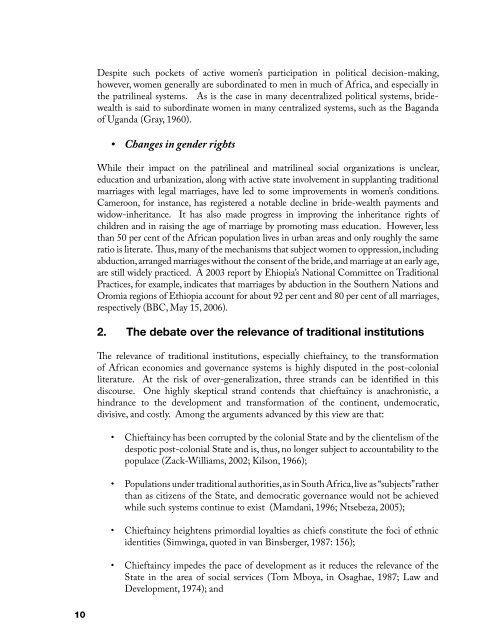Relevance of - United Nations Economic Commission for Africa
Relevance of - United Nations Economic Commission for Africa
Relevance of - United Nations Economic Commission for Africa
You also want an ePaper? Increase the reach of your titles
YUMPU automatically turns print PDFs into web optimized ePapers that Google loves.
Despite such pockets <strong>of</strong> active women’s participation in political decision-making,<br />
however, women generally are subordinated to men in much <strong>of</strong> <strong>Africa</strong>, and especially in<br />
the patrilineal systems. As is the case in many decentralized political systems, bridewealth<br />
is said to subordinate women in many centralized systems, such as the Baganda<br />
<strong>of</strong> Uganda (Gray, 1960).<br />
• Changes in gender rights<br />
While their impact on the patrilineal and matrilineal social organizations is unclear,<br />
education and urbanization, along with active state involvement in supplanting traditional<br />
marriages with legal marriages, have led to some improvements in women’s conditions.<br />
Cameroon, <strong>for</strong> instance, has registered a notable decline in bride-wealth payments and<br />
widow-inheritance. It has also made progress in improving the inheritance rights <strong>of</strong><br />
children and in raising the age <strong>of</strong> marriage by promoting mass education. However, less<br />
than 50 per cent <strong>of</strong> the <strong>Africa</strong>n population lives in urban areas and only roughly the same<br />
ratio is literate. Thus, many <strong>of</strong> the mechanisms that subject women to oppression, including<br />
abduction, arranged marriages without the consent <strong>of</strong> the bride, and marriage at an early age,<br />
are still widely practiced. A 2003 report by Ehiopia’s National Committee on Traditional<br />
Practices, <strong>for</strong> example, indicates that marriages by abduction in the Southern <strong>Nations</strong> and<br />
Oromia regions <strong>of</strong> Ethiopia account <strong>for</strong> about 92 per cent and 80 per cent <strong>of</strong> all marriages,<br />
respectively (BBC, May 15, 2006).<br />
2. The debate over the relevance <strong>of</strong> traditional institutions<br />
The relevance <strong>of</strong> traditional institutions, especially chieftaincy, to the trans<strong>for</strong>mation<br />
<strong>of</strong> <strong>Africa</strong>n economies and governance systems is highly disputed in the post-colonial<br />
literature. At the risk <strong>of</strong> over-generalization, three strands can be identified in this<br />
discourse. One highly skeptical strand contends that chieftaincy is anachronistic, a<br />
hindrance to the development and trans<strong>for</strong>mation <strong>of</strong> the continent, undemocratic,<br />
divisive, and costly. Among the arguments advanced by this view are that:<br />
• Chieftaincy has been corrupted by the colonial State and by the clientelism <strong>of</strong> the<br />
despotic post-colonial State and is, thus, no longer subject to accountability to the<br />
populace (Zack-Williams, 2002; Kilson, 1966);<br />
• Populations under traditional authorities, as in South <strong>Africa</strong>, live as “subjects” rather<br />
than as citizens <strong>of</strong> the State, and democratic governance would not be achieved<br />
while such systems continue to exist (Mamdani, 1996; Ntsebeza, 2005);<br />
• Chieftaincy heightens primordial loyalties as chiefs constitute the foci <strong>of</strong> ethnic<br />
identities (Simwinga, quoted in van Binsberger, 1987: 156);<br />
• Chieftaincy impedes the pace <strong>of</strong> development as it reduces the relevance <strong>of</strong> the<br />
State in the area <strong>of</strong> social services (Tom Mboya, in Osaghae, 1987; Law and<br />
Development, 1974); and<br />
10
















